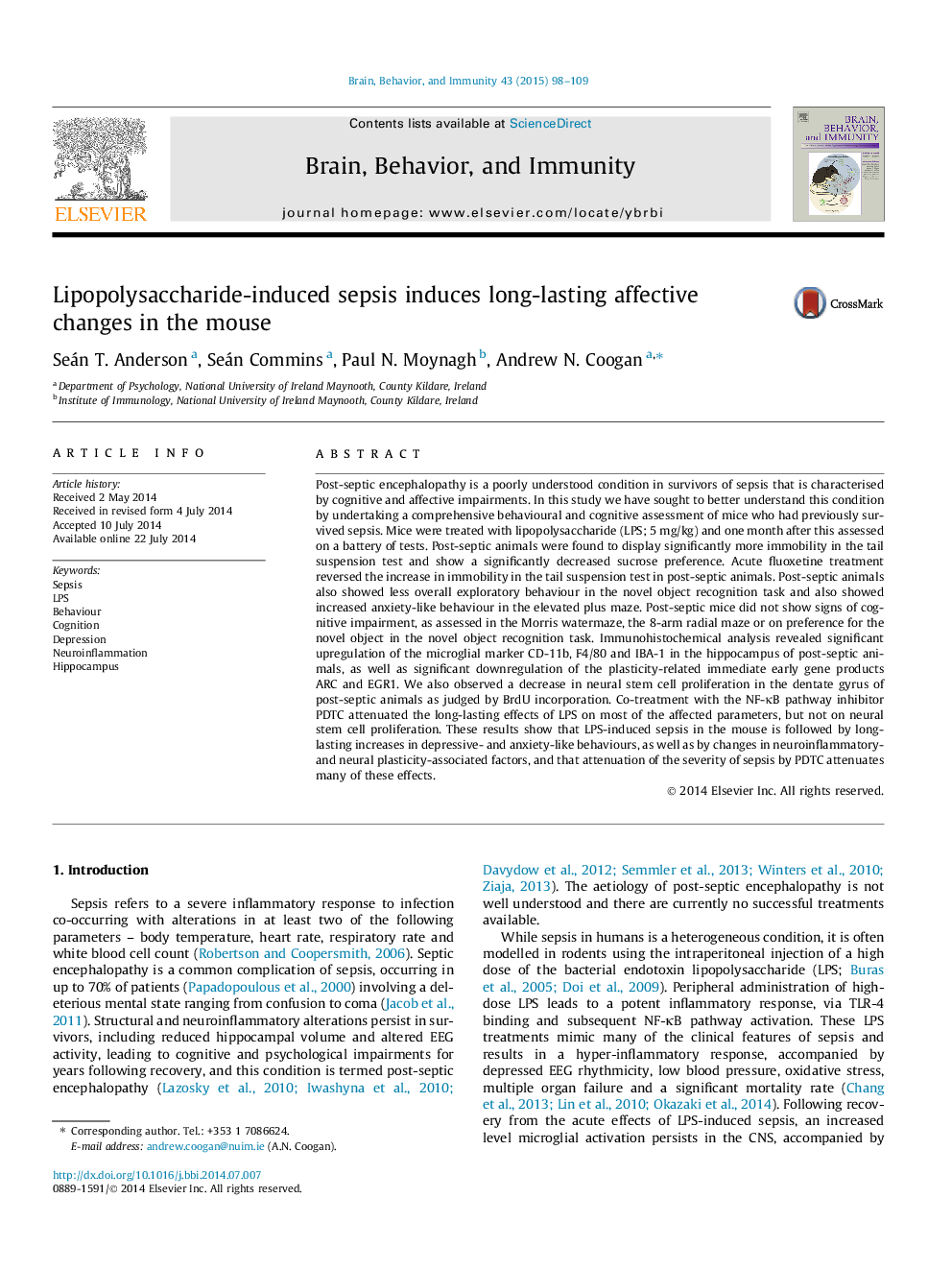| کد مقاله | کد نشریه | سال انتشار | مقاله انگلیسی | نسخه تمام متن |
|---|---|---|---|---|
| 7281414 | 1473924 | 2015 | 12 صفحه PDF | دانلود رایگان |
عنوان انگلیسی مقاله ISI
Lipopolysaccharide-induced sepsis induces long-lasting affective changes in the mouse
ترجمه فارسی عنوان
سپسیس ناشی از لیپوپلی ساکارید موجب تغییرات عاطفی طولانی مدت در موش می شود
دانلود مقاله + سفارش ترجمه
دانلود مقاله ISI انگلیسی
رایگان برای ایرانیان
کلمات کلیدی
موضوعات مرتبط
علوم زیستی و بیوفناوری
ایمنی شناسی و میکروب شناسی
ایمونولوژی
چکیده انگلیسی
Post-septic encephalopathy is a poorly understood condition in survivors of sepsis that is characterised by cognitive and affective impairments. In this study we have sought to better understand this condition by undertaking a comprehensive behavioural and cognitive assessment of mice who had previously survived sepsis. Mice were treated with lipopolysaccharide (LPS; 5 mg/kg) and one month after this assessed on a battery of tests. Post-septic animals were found to display significantly more immobility in the tail suspension test and show a significantly decreased sucrose preference. Acute fluoxetine treatment reversed the increase in immobility in the tail suspension test in post-septic animals. Post-septic animals also showed less overall exploratory behaviour in the novel object recognition task and also showed increased anxiety-like behaviour in the elevated plus maze. Post-septic mice did not show signs of cognitive impairment, as assessed in the Morris watermaze, the 8-arm radial maze or on preference for the novel object in the novel object recognition task. Immunohistochemical analysis revealed significant upregulation of the microglial marker CD-11b, F4/80 and IBA-1 in the hippocampus of post-septic animals, as well as significant downregulation of the plasticity-related immediate early gene products ARC and EGR1. We also observed a decrease in neural stem cell proliferation in the dentate gyrus of post-septic animals as judged by BrdU incorporation. Co-treatment with the NF-κB pathway inhibitor PDTC attenuated the long-lasting effects of LPS on most of the affected parameters, but not on neural stem cell proliferation. These results show that LPS-induced sepsis in the mouse is followed by long-lasting increases in depressive- and anxiety-like behaviours, as well as by changes in neuroinflammatory- and neural plasticity-associated factors, and that attenuation of the severity of sepsis by PDTC attenuates many of these effects.
ناشر
Database: Elsevier - ScienceDirect (ساینس دایرکت)
Journal: Brain, Behavior, and Immunity - Volume 43, January 2015, Pages 98-109
Journal: Brain, Behavior, and Immunity - Volume 43, January 2015, Pages 98-109
نویسندگان
Seán T. Anderson, Seán Commins, Paul N. Moynagh, Andrew N. Coogan,
